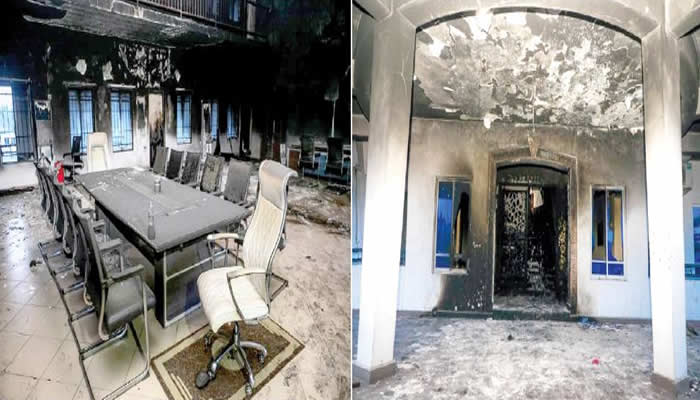The political struggle for the control of Rivers State has reached a violent climax as Governor Siminalayi Fubara and his former political mentor, Nyesom Wike, clash over authority in the region, exacerbated during the October 5 local government elections. The confrontation between the two figures escalates as the political landscape remains fraught with animosity following the contentious electoral process. This conflict is rooted not just in personal rivalry but also revolves around the leadership of the Peoples Democratic Party (PDP) in Rivers, with Wike wielding significant power over party dynamics, even as Fubara strives to establish his foothold by aligning with other factions and parties. The state is left in chaos as both sides struggle for supremacy, setting the stage for a deeply polarized political atmosphere.
The lead-up to the elections was marred by instability as various political factions, particularly the All Progressives Congress (APC) led by Tony Okocha and a faction of the PDP under Aaron Chukwuemeka, withdrew from the election process. Citing a lack of transparency and due process, both parties claimed that the Rivers State Independent Electoral Commission (RSIEC) failed to involve them in important pre-election meetings. This further fueled distrust and discontent among political players, culminating in Okocha’s legal challenges against the electoral process. Despite these obstacles, RSIEC maintained its position, insisting on proceeding with the local government elections without the participation of these factions, thereby sowing the seeds for unrest.
On the day of the elections, violence erupted in various forms, beginning with two significant explosions at political party headquarters that underscored the brewing tension in Rivers State. Eyewitness accounts described chaos as gunfire rang out and explosions rocked congregating areas, prompting voters and officials to flee for their safety. The incidents at the APC secretariat and the Ohio/Akpor local government secretariat illustrated how quickly the situation deteriorated. Law enforcement struggled to maintain order, as police forces unable to contain the aggressive atmosphere contributed to the disorder rather than quelling it, leading to further escalations across the state.
As the newly elected local government officials attempted to take control of the secretariats post-election, they met fierce resistance, primarily fueled by supporters of Wike who expressed discontent with the electoral outcomes. Local government areas like Ikwerre and Eleme experienced devastating attacks, with property destruction, looting, and arson becoming rampant. The violence reached its peak in Ahoada East, where gunfire forced an urgent response from both police and military personnel, showcasing the alarming intensity of the civil unrest following the elections. Civilian casualties emerged from these clashes, including the tragic death of individuals related to political figures, which only added to the narrative of violence and retribution in the region.
In light of this unrest, Fubara commenced measures for accountability, announcing plans for a judicial panel of inquiry to investigate the circumstances surrounding the violence and destruction. Reflecting on the historical context of previous violent episodes in Rivers State, Fubara underscored the significance of transparency and justice in restoring order post-election. His efforts indicate a commitment to addressing the political and social fallout stemming from the local government elections, aiming not only to uncover the truth but to deter future violence. The emphasis on accountability is crucial as political actors grapple with the aftermath of an unprecedented election marked by turmoil.
Amidst this chaotic political landscape, the Rivers State Police Command also pledges to take action through establishment of a high-powered investigation team. This dual approach of government and police intervention resonates with the urgent need for stability and security in the region. However, the effectiveness of these efforts remains uncertain as public confidence in authorities wanes following the violence and civil disorder. The coordinated response of law enforcement to the challenges posed in the aftermath of the elections will be critical in establishing a semblance of control in the politically charged environment of Rivers State.
The struggle for the political soul of Rivers continues, with a schism evident between the two factions represented by Fubara and Wike, alongside the factions that opted out of the polls. Each party appears prepared to make strategic moves to assert control over the local governance landscape, raising concerns about the future political trajectory of the state. As these dynamics evolve, all eyes will be on forthcoming political developments, inquiries, and the implications of this violent dispute on governance and civic safety in Rivers State. The potential for reconciliation, or further fragmentation, hinges on how effectively these leaders and institutions respond to the urgent calls for justice and stability in the face of mounting discontent.














